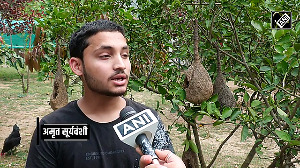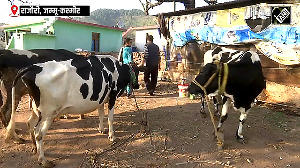Barack Obama and Hu Jintao tried to pretend that they did not have to take any notice of India's invisible presence, but there it was, as an unseen guest and an indispensable factor in their deliberations and decisions, says former ambassador TP Sreenivasan
When Presidents Obama and Hu Jintao sat down for their parleys in the White House last week, an apparition in the shape of India must have appeared from time to time, at times distracting them, at times reminding them of the geography and history that must determine their policies and postures. They tried to pretend that they did not have to take any notice, but there it was, as an unseen guest and an indispensable factor in the deliberations and decisions.
The United States-China-India triangle has already become a reality in world politics, even though the US engagement with China is qualitatively at a higher level than with India. In the curtain-raiser to the visit, the US state department specifically compared Hu's visit to President Obama's visit to India and pitched the expectations from the Chinese visit at a lower level. The Chinese, on the other hand, must have hoped and expected that Hu's visit to Washington would be more productive than Wen Jiabao's visit to New Delhi.
China has long maintained that its affinity is to the developing world and its neighbourhood, but India has been an exception as tensions developed between the two neighbors early in their modern history. Instead of rectifying this aberration, China now alleges that India is seeking friends a long way away to the detriment of its own interests in the region. In Chinese calculations, one of the objectives of the engagement with the United States must be to keep the US and India apart. It would rather make concessions to the US rather than to India to gain for itself a commanding position in Asia and get US recognition for it. President Clinton in his time and President Obama, during his first visit to Beijing, had conceded this position, but the US is, of late, more circumspect on this aspect.
Prime Minister Manmohan Singh was the first state guest in the Obama White House. Though visitors closer to the US did not receive the honour except the president of Mexico, Hu could not have been treated differently and so he became the third head of state to enjoy a state dinner hosted by Obama. The difference, of course, was that while the Indian prime minister was treated as a friend from the start, the nature of the relationship was left open in the case of Hu. In a rather undiplomatic statement, Hillary Clinton said the red carpet was being rolled out for Hu so that the US could determine whether China was a friend or foe! Her expectation was only to have a normal relationship. In the case of India, it is a natural alliance and a strategic relationship. At the end of the visit, the crucial issues between the two countries appeared to remain. The best that could be said about the visit was that it enabled the two countries to understand each other better. The Chinese visit to India was not very different.
One parallel that the White House did not want during Hu's visit was the snafu at the Indian dinner during which two socialites had gate crashed into the security ring. No such thing happened this time, but there were moments of embarrassment when the interpretation into Chinese did not come through properly. But it was a blessing for Hu because it happened when a question was raised on human rights in China. When Hu was asked why he did not answer the question, he said he could not hear the question in Chinese. Then Hu went on to say that much needed to be done in the field of human rights in China, linking it with development needs. The intruders did not cause any harm to the Indian prime minister, but Hu paid a price for not getting to answer the human rights question on the first occasion.
India came to mind in another context when China tested its stealth aircraft when the US fefence secretary was just about to call on Hu in Beijing. It had more or less the same effect as when the Chinese invaded Vietnam at a time when the then Indian Foreign Minister Atal Bihari Vajpayee was on Chinese soil. China offered no explanation for the Vietnam adventure, but it explained to the Americans that the testing was not related to Gate's visit and that the stealth bomber did not mean a threat to anyone.
When some important Congressmen boycotted the state dinner in Washington, the US diplomats must have thought of the Forward Bloc in India, which boycotted President Obama's address to the Indian Parliament. Hu also faced demonstrations by Tibetans, Uighurs and democracy activists. Senate Democratic Majority Leader called Hu a "dictator". None of these was reported in Beijing. In any event, the Chinese leaders have the capacity to suffer insults as long as they accomplish their mission.
President Obama was more effusive with Indian leaders than with the Chinese. He used Hindi phrases and quoted from Indian texts profusely in Delhi. But the only occasion when he tried out his Chinese was when he said, "cheers" ("genbei").
The outcome of Hu's visit also had some parallels with Obama's and Wen's visits to India. Both Obama and Wen carried massive contracts from India. Obama signed contracts work USD 15 billion in India, Hu signed contracts worth USD 45 billion in Washington. Obama offered political concessions to India for forging a new economic and political relationship with India. Wen did not fall to that temptation, either in New Delhi or in Washington. On issues such as the value of the Chinese currency, trade etc, there was no concrete forward movement, though China understood the strong feelings in Washington. But the big difference was that the lack of progress on issues like the border, Jammu and Kashmir and Arunachal Pradesh raised concerns about Indian security, but the Washington meeting did not expose any new irritants. Wen used the Delhi visit to assert China's strength, while Hu sought equality with the United States. The contracts Hu signed in Washington went a long way to assuage the American sense of being overwhelmed by the adverse trade balance.
Comparisons will be made about the US approach to China and India, the Chinese attitude to the US and India and the Indian policy to the US and China. These are not zero sum games, but they are interlinked and interdependent. For the US, China is of utmost importance, with India as a distant second. But the US has greater influence in India than it has in China. China wants equality with the US, but takes its superiority over India for granted.
For India, both the US and China are important, the first for constructive cooperation, the second for removing threats and to develop a partnership. The three countries have "core interests" to be accommodated by the other two. For the US, it is the currency; for China, it is Tibet and Taiwan; and for India it is the border settlement and Jammu and Kashmir. In all bilateral discussions, in any of the capitals, the third country will appear stealthily like Banquo's ghost.
T P Sreenivasan is a former ambassador of India to the United Nations, Vienna, and a former Governor for India at the International Atomic Energy Agency, Vienna. He is currently the Director General, Kerala International Centre, Thiruvananthapuram, and a Member of the National Security Advisory Board









 © 2025
© 2025